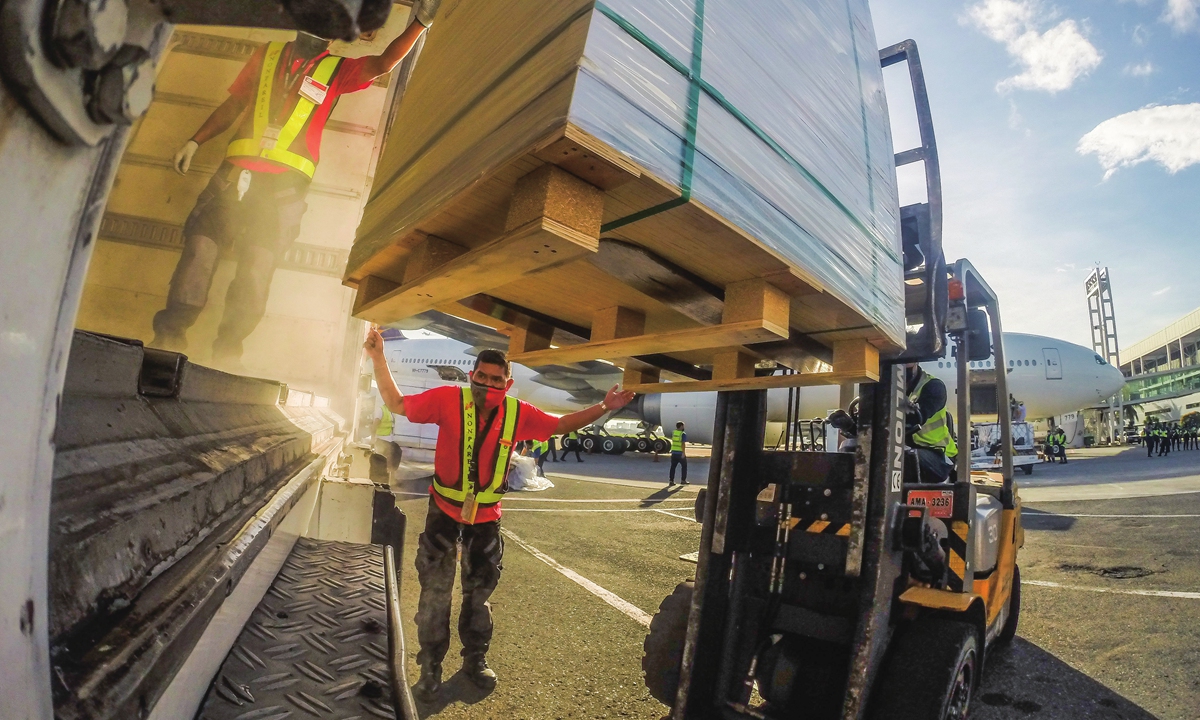
Staff members transport a cargo shipment of China-made Sinovac vaccines in Manila, the Philippines on November 17, 2021. Photo: Xinhua
The Chinese Embassy in the Philippines said on Wednesday that they welcomed and took notice of the hearing held in the Philippine Senate committee on foreign relations on Tuesday regarding the US military's smear campaign against Chinese vaccines in the Philippines during the COVID-19 pandemic, stating that this matter is related to the lives and health of the Filipino people, and the Filipino people and the international community have the right to know the truth.
The Philippines is currently requesting further clarification from the Pentagon regarding a covert US propaganda campaign that sought to sow doubt among Filipinos about Chinese vaccines during the pandemic.
Senator Imee Marcos on Tuesday led a foreign relations committee hearing into an alleged US military plan to discredit China's Sinovac vaccines in the Philippines through the use of social media trolls.
In a resolution introduced by Imee Marcos obtained by the Global Times, it says that "these anti-vax and misinformation campaigns gravely threaten national security issues and public health; there is a need to verify if indeed, the anti-vax and misinformation campaign was orchestrated by the US Military. In the affirmative, there is a need to determine the ramifications of the actions of the US Military, any potential breach of international law by the United States of America, and the possible legal recourse available to the Philippines, considering that such anti-vax and misinformation campaign threatens national security."
"Therefore, be it resolved, as it is hereby resolved by the Philippines Senate, that the Foreign Relations Committee be directed to conduct an inquiry, in aid of legislation, into the alleged anti-vaccine propaganda by the US Military during the COVID-19 Pandemic," the resolution read.
Local media reported that Marcos said during the hearing that the disinformation campaign against the more accessible vaccines at the time - Sinovac - discouraged Filipinos from taking the Chinese jab and made them more vulnerable to the illness.
"Disinformation had its malign effects. The numbers are shocking. We're talking about millions, hundreds of thousands. This is no meager number. This is much worse than the body count and casualties of war," Imee Marcos said.
Senator Imee Marcos, who chairs the Foreign Relations Committee, also described the US military campaign as "evil, wicked, dangerous, unethical," Reuters reported on Tuesday.
Imee Marcos, who is the sister of Philippines President Ferdinand Marcos Jr, said the number of Filipinos who had fallen ill and died from COVID-19 was "shocking."
A disinformation expert urged a Senate committee on Tuesday to investigate the possibility that subcontractors from the Philippines being involved in crafting messages that were used in the Pentagon's alleged anti-vaccination campaign against China during the COVID-19 pandemic, Philstar reported on Tuesday.
A Reuters investigation on June 14 detailed how the Pentagon ran a clandestine influence campaign in 2020 and 2021 to denigrate the Sinovac vaccines and other pandemic related aid from China across the developing world.
Through sham internet accounts designed to impersonate Filipinos, the military's propaganda efforts morphed into an anti-vax campaign. Social media posts decried the quality of face masks, test kits, and the first vaccine that would become available in the Philippines - China's Sinovac inoculation, according to the Reuters report.
In an exclusive response to the Global Times, Yuan Youwei, a Sinovac spokesperson, said that stigmatizing vaccines can lead to extremely serious consequences like causing mistrust between science and public health, among others.
Yuan told the Global Times that the company was aware of the report and appreciated the fact that Reuters revealed the US military scheme to the public.
"Throughout history, there have also been people who have wrongly attacked vaccines, which have caused huge disasters. Stigmatizing vaccines can lead to a series of extremely serious consequences, such as lowering vaccination rates, disease outbreaks and epidemics, social panic and unrest, and crises of trust in science and public health," Yuan said.




